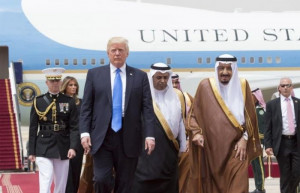
Let’s not forget that the US has constructed, or at least attempted to construct, such alliances in the past too. Back in the 1950s, when the US was busy fighting the Soviet Union, it tried to establish such an alliance known as the Baghdad Pact .The very proceedings of the summit reveals that there is yet again a very specific and local focus to this alliance too as this is not meant to be a general Arab alliance, but rather a “unified Sunni coalition of countries” intended to counter one specific country which, in the words of Trump, has “fueled the fires of sectarian conflict and terror” in the region.
While he wasn’t saying things we have not heard in the past and that he was merely sanctioning a widely held political belief in the Arab world, there is no gainsaying that Trump’s sale of weapons, worth around 110 billion dollars, cannot buy the Middle East durable peace, let alone fight terror.
The message from Iran is, however, different. It reads: no strategy to address the instability that plagues the Middle East can succeed without the expansion of political participation and genuine dialogue. Having endured revolution, war, and isolation, Iranians, who wilfully voted Rouhani back into presidency, appreciate that a better future begins with the ballot box, and a vote that galvanizes spontaneous street parties should be one that Washington welcomes rather than the one which knows nothing about elections and political processes and has been repeatedly attacking the forces fighting terror outfits.
As such, regardless of the promise of “isolating Iran” Trump made in during the summit, the fact remains that selling and buying lots of weapons cannot bring peace back to the region. If the past is of any guidance to future, the last time the Saudis spent that kind of money was when they provided billions to the Iraq’s Saddam Hussein in the 1980s to arm his war against Iran. The Middle East, ever since then, has been a picture of continuous war. And, it is going to remain so.
Consider the forces the House of Saud is fighting and using its weapons against. It is not al-Qaeda, or Daesh or other terror networks. In Yemen alone, Saudi Arabia is attacking the Ansar Allah group, the one force that has proved adept at beating back Al Qaeda in the Arabian Peninsula, the most lethal of the global terrorist network’s franchises. The tragedy of Yemen echoes equally in Syria where the forces fighting ISIS continue to receive loads of Saudi-funded groups to eliminate before durable peace can be established.
On the other hand, the House of Saud sees in projecting Iran as the enemy of peace and a sponsor of terrorism an excellent opportunity to distract the world from its global export of Wahhabism, an ideology that inspires the extremist ideology of Al Qaeda, the ISIS and many other terrorist groups wreaking havoc from Karachi to Manchester.
Will the plan come to fruition?
Regardless of the grand-show put together in Saudi Arabia and the huge profits the US military industry complex made therein, the question remains: will the House of Saud succeed in its ambitions? Can the “Arab-Nato” really set off or will it end up galvanizing sectarian minorities living in the Arab world? Were that to happen, the “Arab-Nato” might be having to fight a war within its own boundaries than somewhere outside, in Yemen or in Iran.
Therefore, the big question is: What does a “unified Sunni coalition of countries” mean to tens of millions of people, who are Shia, that include majorities of the populations of Iraq, Lebanon, and Bahrain, and large minorities in Yemen, Syria, Saudi Arabia, Kuwait and other Gulf countries? Will they subscribe to it or become targets of their own governments’ reckless ambitions?
One way or the other, the sectarian colour put on the “Arab NATO” is likely to end up igniting sectarian sentiments on an unprecedented scale, the flames of which would first fall inside the partner countries themselves rather than Iran.
Notwithstanding the prospects of “Arab-NATO” tearing apart its own societies, what also remains a problem is the question of how this alliance would work out its own internal differences. Much to the disappointment of Saudi Arabia, not all of the countries see Iran as an eternal enemy. Even those who do don’t support Saudi ambitions, nor simply extend support to the Saudi-funded militias.
For instance, take the case of Libya which is almost 100 per cent a Sunni country. But members of the “Arab-NATO” have not been seen, as of lately, following the same course of action. As such, while all warring factions in Libya are Sunnis. Egypt and the United Arab Emirates provide support to some of these militias, while Bahrain and Saudi Arabia assist other forces. Turkey and Qatar back the third group.
What, and who, in this scenario the “Arab-NATO” will do and consider its enemy? Such a question, whenever it arises in the future, will test the alliance to its limits and would render it ineffective and meaningless in terms of solely serving the Saudi interests in, for instance Yemen, where they are fighting a war which was thought to end in just two weeks.
The House of Saud’s choice of buying lots of weapons is a dangerous course, threatening to tear it apart from the inside and bankrupt it from the outside, taking it a bit closer to the stage where it might self-destruct, and leaving its future generations to wonder about what was wrong with elders when they chose weapons and bought war for themselves.
Salman Rafi Sheikh, research-analyst of International Relations and Pakistan’s foreign and domestic affairs, exclusively for the online magazine “New Eastern Outlook”.
